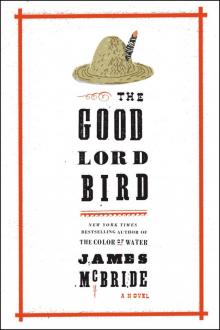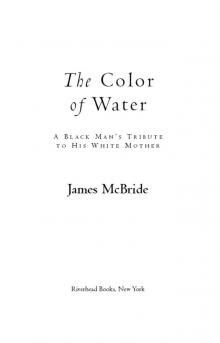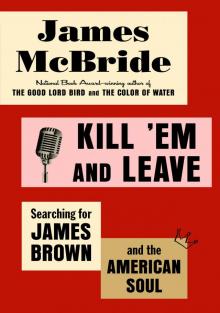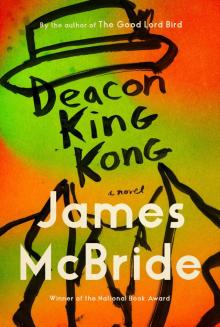- Home
- James McBride
Miracle at St. Anna Page 3
Miracle at St. Anna Read online
Page 3
Then he felt nothing. He was clear. All was well. It was quiet.
He lay there for seconds, minutes, hours—he could not tell, because it was dark and he did not know what time was and had only seen a watch once somewhere long ago. He had heard someone speak of time before, but that memory lay deep in the jagged-glass wind tunnels of his mind and he could not find it. He wondered how old he was. He decided he was six. Then he wondered how he had wondered it, since he lived with no front, back, or middle. He suddenly realized that since he’d lost track of time maybe he’d lost being six, too. He felt hungry. His chest hurt. He opened his mouth and cried, “Help! I’m six! Help!”
He heard a rumbling sound from above him. A voice. A piece of the rubble was being pulled away. Then another. A sudden sliver of light cut through the rocks and the plaster dust as it billowed about. A slab was lifted from across his head. The sun struck his face like a punch. He shut his eyes. Then a figure blocked out the sun, and he opened his eyes again.
At first he thought it was the Old Man, but it wasn’t. This man was a giant, a huge chocolate giant, staring down at him from underneath a battered American helmet, its chin strap dangling lazily in the sun, bandoleers crisscrossing his massive chest, rifle slung horizontally across his back. The giant was straddling the rubble with massive boots, one knee touching the ground, the other leg stretched over the beam covering the boy’s chest. His skin was as black as coal. His teeth were white as diamonds. The boy had never seen anything like him.
“Good God,” Train said.
The boy had heard of men like this, somewhere in the corners of his jagged-glass wind memory, but he could not recall. “Where is your tail?” he said in Italian.
The man ignored him and looked around, his huge head swiveling, his large brown eyes rolling from left to right in their sockets.
“I don’t have any oil to drink,” the boy said. His chest ached.
The giant looked at the beam pressing against the boy’s chest. He placed his large hands around it, grunted heavily, and tried to lift it. It would not budge. He tried again, and the beam shifted slowly and the boy cried out. The sound of his voice seemed to scare the giant, and with one mighty heave he pulled at the huge beam again. Sweat ran down his face in rivulets and into the corners of his wide mouth. He gritted his teeth, and from within his black face the white teeth shone like tiny lightbulbs. He thrust his mighty head toward the ceiling and said, “Lordy . . .” and lifted, his huge hands trembling as the beam slowly rose up, higher and higher.
Only then did the pain hit the boy, it hit him so hard he felt like he’d been jerked into a fire and flung into the jangled glass of his own memories. It washed over him with such force that he couldn’t contain it. He felt himself being lifted, high, toward the sun, and he heard the solder cry out, “Hey, Bishop! Bishop!” and then the Negro colossus stuck his ear to the boy’s mouth to see if he was breathing.
The boy could not resist. Chocolate. A giant chocolate face. He reached out to touch the man’s face. Then he licked it. It tasted terrible. But then sweet unconsciousness came, and it was as sweet as anything he could imagine.
3
THE CHOICE
The Germans came down to the Cinquale Canal from the mountains in a pincer movement, going around the barn on both sides as they rushed forward to meet the American attack. Lying behind the wooden beam with the boy, Train could see them through the jagged ruins of the barn, which was completely open on one side. The beam and stones of the wreckage covered them somewhat, though any of the Germans who ran by could have looked in and seen them if they had wanted to. They didn’t seem to have a mind to.
In his invisibility—Sam Train felt it coming and hoped he was right—Train marveled at how tiny the Germans were. He expected them to look like the ones he’d seen in the newsreels back in training camp at Fort Huachuca, Arizona: straight-backed, strong, fit, neat, with starched uniforms and shiny helmets, high-stepping by the thousands as they marched past in formation, arms outstretched in that funny salute as they greeted the biggest white man of them all, Hitler. Instead, he saw soldiers that looked like skeletons, some without hats or helmets, boys and old men, with torn and ragged uniforms, emaciated, exhausted, panicked, stumbling past and yelling at one another as if their hair were on fire. One lurched by laughing madly in a high-pitched voice; another ran past sobbing like a child. Some were dressed like Italians he’d seen everywhere—in fact, he could’ve sworn he saw two Italian mule skinners from Fifth Battalion that were in camp the day before—and right as he was thinking how unfair it was that they could switch sides anytime they wanted, being white and all, a few more Italians appeared from another direction and shot the two Italian mule skinners he had just seen. “Lord,” he murmured to the boy. “I don’t know who’s who.”
The boy paid no attention to this, largely because he seemed to be dead. Train squeezed himself farther behind the beam, moving the child’s body a little closer to it to keep him out of sight of the open end of the barn, and examined him closely. He laid his own head flat on the ground behind the beam, facing the kid, their noses almost touching, his face just inches away. He nudged the boy gently to see if he was breathing.
Train had never touched a white person’s face before, even though, he thought glumly, this one looked dead. He had met a white child in his hometown of Mt. Gilead once—Old Man Parson’s little grandson. The boy had come out to the field to watch him pull his mule one afternoon and had even held Sam Train’s hand, but his ma had seen him out there and shooed him back into the house.
Train took his hand off the boy’s face and regarded him as the shouts and machine-gun fire began to head down the mountain away from him. The boy, even catatonic, was beautiful. He was dark, olive-complexioned, with smooth skin and soft black hair that glistened. His head was shaped like an onion, giving him an almost dowdy look, set off by eyes that were wide apart and a rounded chin that was shaped like an O. He was skin and bones, his pants cut off at the ankles, sliced off with a knife, no hems, and his bruised feet were blistered and swollen from malnutrition. His swollen feet looked as if they belonged on a man, and if he hadn’t been so terrified, Train might have thought to laugh.
The sound of machine-gun and artillery fire seemed to descend farther down the valley, but Train could still hear moaning nearby from those who’d been shot. Suddenly the enormity of his situation began to collapse on him—he realized he was cut off from everyone and trapped on the wrong side of the canal—and he turned his head away from the boy and started to vomit uncontrollably. The image of Huggs’s face floating in the water seized his mind and wouldn’t let go. Some of Huggs’s brain had splattered on Train’s ear when he was hit—it had looked like oatmeal—and Train rubbed his ear furiously as he vomited, unable to stop.
After a while, the sun came up full in the sky, and it began to get warmer, and the firing died down. The vomit next to his face began to stink, so Train turned his head the other way and saw the boy lying on his back, eyes still closed, breathing in quick short breaths like something was caught in his throat. Train was afraid the boy would start moaning, but he did not.
Instead, he tried to sit up.
Train pulled him down firmly.
“Don’t move no more,” he snapped.
The boy’s dark eyes widened, and he slid back out of arm’s reach. Train realized his mistake and made a series of shaking motions with his hand to calm the boy. It had no effect. The kid began to whimper softly, and Train could feel panic rippling through his spine.
He considered shooting the boy. No one would know. He wanted to reach out and cover the boy’s mouth, but he had slid too far away and Train was scared to move. He rubbed the magic statue head at his side quickly to no avail, then desperately searched through his pockets for something to make the kid shut up. His fingers came upon a hand grenade. He shoved that thought from his mind and settled on a wet, mushy chocolate D bar in his front pocket. It was sticky and nearly melted from th
e canal water and his body heat. He placed it on the ground and, with trembling hands, slid it across to the kid, who stared at it a moment, then grabbed it, sniffed it, and greedily stuffed the whole thing in his mouth, paper, chocolate, mud, everything.
“More,” the boy said in Italian, his mouth full, licking his fingers.
Train covered his own lips with a finger to “shhh,” but the kid ignored it.
“More!” he cried.
Train rose on his elbows to inch toward him and as he did, out of the corner of his eye, he saw the German soldier trotting nearby. The German wasn’t staggering forward in mad desperation like his fellow soldiers. He was jogging downhill slowly far behind them, as if they all were running to an event at the state fair and he was the last of the pack to get there and didn’t mind it a bit, a sort of not-too-fast, no-need-to-hurry, the-fat-bearded-lady-isn’t-going-anywhere kind of trot. He was ten feet off, his rifle held low, and he was almost past when he suddenly turned in Train’s direction.
Train and the German saw each other at the same time, and even as Train clumsily swung his M-1 up with his left hand, his head dizzy, hastily propping the gun barrel on the wooden beam, hoping that the safety was off and nearly wetting his pants at the same time, he realized he wasn’t invisible anymore, and he cursed the boy and Bishop, too, for putting the mojo on him. He had found a way to survive the war, and they had ruined it.
“I’m invisible,” he cried, and he shut his eyes and fired, shooting with his left hand and propping himself up with his right. The gun barrel danced wildly, bullets pinging through the wreckage and zinging everywhere.
The German soldier hesitated for a moment, then dropped like a sack of potatoes. His boots flopped awkwardly in the air and plopped back down to earth again.
Train sprang to his feet and ran.
He was ten feet off before he realized the webbing at his side was empty. The statue head was gone.
He turned around just as two more Germans appeared from a clump of bushes about a quarter of a mile away up the ridge and began to run at him. He stood, frozen for a moment, looking back at the statue head, which had fallen out of the netting and had rolled back to the barn near the kid, who was now writhing around. Train was still out of range. He had time to go back and get it. But with the rifle in his left hand, his free hand could grab only one.
Which?
The boy.
Or the statue head.
The boy.
Or the head.
He stepped back and grabbed the statue head and ran toward the canal. He saw what appeared to be the back of a German soldier wading out of the canal and disappearing into the woods on the opposite side, so he turned around and ran the other way, past the barn, toward an olive grove that was downstream and behind it.
The boy was still lying near the beam in the destroyed barn when Train sprinted by crazily the second time. Train ignored the boy, hearing rounds kicking up on all sides of him.
The black Americans from F Company had made a fight of it farther up, where the canal was shallower, and had driven the Germans back across to Train’s side. They lay out of range, on their stomachs on the bank across the creek, and could see Train leaping and running through the high mountain grass, holding the head of the statue like a football as machine-gun fire, bullets, and artillery shells chewed up the earth all around him. From across the creek, some of them laughed.
Train was all the way to the safety of the olive grove when he looked back and saw the kid, scrambling in wounded, terrified confusion, desperately trying to drag himself over the wooden beam and deeper into the safety of the barn rubble. The kid had somehow managed to maneuver the upper part of his body across the beam but could go no farther. Chocolate was smeared on his face. His tiny arms frantically clung to the beam, and his legs kicked to no avail. Machine-gun and artillery fire began to kick around the barn, and the Germans began to walk artillery shelling toward it.
This action prompted a round of cursing and vicious fire from F Company on the American side, who could see the boy but could not reach him. The German gunners in their artillery positions high up on the opposite slope could not see the boy at all, and the desperate urgency of the American firing propelled them to direct their cannon blasts at the boy with an even greater fury.
In that moment, Train realized he had to go back.
He strapped his rifle to his back and, still holding the statue head, leaped out from the grove. As he sprinted across the field again, the Americans across the creek gave covering fire. But their attempt at protection didn’t matter. It came on him again. True and real. Invisibility. He could’ve walked over there with an ice cream cone like it was Sunday morning after church. Nothing would touch him. He could see better, hear better, smell better. There was no noise, no pain, no fear. He felt the rush of fresh Tuscan morning air on his face, heard every bush, every tree, every rock, which seemed to speak to him, shake his hand, saying, Hello, Sam Train. Good morning, Sam Train. We love you, Sam Train. What can we do to help you out today, Mr. Sam Train?
This, he thought as he leaped over rocks and gullies, is what it must feel like to be white.
He snatched the kid in one long arm and ran for the cover of the olive grove again. Every single tree, branch, bush, and rock was smoking with lead and cordite as he ran. Bullets and shells smacked against the plants and trees, which fell en masse, as if a giant lawn mower were sweeping the plains, and as he ran he heard them cry out. Since they had spoken kindly to him and he knew they could not speak to anyone but him, he howled for them, for he knew they depended on him to tell the world of their pain, since his invisibility made him privy to their feelings whereas the rest of the world was not. He was responsible to them, he knew. When he reached the edge of the grove and made it into the safety of the olive trees, he was unhurt and feeling wiser and deeper inside than he’d ever felt in his life.
Then, instead of turning to run across the canal back to the Americans, he ran in the opposite direction, deeper into the grove and toward the mountain behind it.
Across the canal, heaving with sweat, having been driven farther downstream by the fire of the Germans, who had overtaken their position in numbers, the three remaining members of Train’s squad, Bishop Cummings, Hector Negron, and Second Lieutenant Aubrey Stamps, ceased their covering fire and watched him in disbelief.
Stamps turned to Bishop. “What the hell you do to him?”
“Nothing.” Bishop didn’t want to talk about it. His little hustles with the ignorant Negroes from the South were none of Stamps’s business.
“You know that nigger’s dumber than a dime. You sent him over the hill?”
“I didn’t tell him to risk his neck for nobody,” Bishop said. He and Stamps could see Sam Train’s back as he dipped in and out of the trees, climbing higher and higher into the ridge, the little boy slung over his shoulder, his face a white speck in the dark green of the mountain.
The fire was dying down. The Germans were heading up the canal toward Poveromo. Some were setting up camp on the other side of the canal, within full view but out of range. The fighting had gone out of everybody. Stamps heard a German yell in thickly accented English, “Hey! You niggers cut our phone wire.” He heard laughter from the American side.
Stamps watched Train’s back as he continued to climb.
“Well, we gonna get him or not?” Stamps asked.
Bishop snorted. “You the big lieutenant, not me.”
Stamps was undecided. He had no idea what to do. This was his first time leading a squad. Huggs, the squad leader, had been dead ten minutes. They’d slugged it out to get across the canal, and when he’d radioed the base to deliver artillery fire so they could maintain their position and move the Germans back up the mountain, the captain had told him, “It’s impossible for you to be over there. Get back here.” Stamps had radioed three times, and each time, the captain, Nokes, had cut him off, called him a liar, and told him to get back. If Nokes had shelled Stamps’s c
oordinates on the other side of the canal, the Germans would have been cut off on one side and the Americans would have it right now, he thought bitterly. His company, Company G, had crossed with Company H on their right. All they had needed was artillery support to the right of Company H to help them hold off the flanking Germans while they pierced the bank, established a foothold, and moved their tanks across. Instead, Nokes had shelled to their left, on Company F’s side—which already had their own artillery support—leaving companies H and G exposed. Stamps would bet a hundred bucks that he knew why. H and G companies both were commanded by Negro first lieutenants. F Company was commanded by a white captain. Nokes, from his safe position a mile back at the fire-control center, couldn’t see either. He had fired on F Company’s side because their white captain had radioed that they’d made it across, too, and when a white man said something happened, by God it was gospel. As a result, H and G companies were just about destroyed. Stamps didn’t know Captain Nokes at all. The man was brand-new. As far as he knew, the guy had no knowledge of how to fire artillery. He was a transfer from an engineering company. Huggs was the one who had told him how to do everything. Now Huggs was dead in the fuckin’ canal, and this scared sissy was running the show till he got his transfer out, which he most certainly was trying to do like most of the white captains did, trying to get away from the niggers.
“Hector, your radio working?”
Hector Negron was twenty-one, a Puerto Rican from Spanish Harlem. He sat in a crouch, smoking a cigarette, staring sleepily at Stamps. He was in shock from all he had just witnessed, and at times of extreme nervousness, he shut down and became sleepy. He’d been meaning to see a doctor about it.
“Sí. But it’s a diaphragm job. Just your voice powers it.”
“Get on it and see where everybody is.”
“Everybody is everyplace.”
“What the fuck you mean by that?”

 Miracle at St. Anna
Miracle at St. Anna The Good Lord Bird
The Good Lord Bird Song Yet Sung
Song Yet Sung The Color of Water
The Color of Water Kill 'Em and Leave
Kill 'Em and Leave Deacon King Kong
Deacon King Kong Miracle at St. Anna (Movie Tie-in)
Miracle at St. Anna (Movie Tie-in)